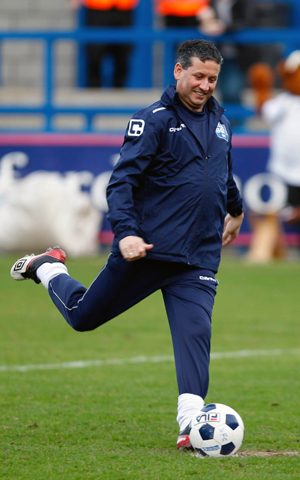JOHN COLEMAN wasn’t looking forward to Christmas. As an out-of-work manager he’d missed his first Easter bank holiday and pre-season in decades, and the absence of a Boxing Day and New Year derby double-header would have been enough to drive a man to drink.
Then the call came to replace Alan Wright at the Merseyrail Community Stadium, home to struggling Southport, who had started the season well but with seven defeats in ten Skrill Premier games, had slumped towards the drop zone like an office party pace-setter on the last train home.
Although he has great sympathy for his young predecessor – admitting that waiting for someone else’s misfortune to bring you luck is one of the worst parts of football – where better to get a “spring back in (his) step” than at a club where he’s respected for scoring 71 goals in 142 games between 1985 and ’87?
And where chairman Charlie Clapham will surely share the boardroom sherry if Chester are beaten on Thursday!
Mentor
Coleman, who spent nearly 13 years lifting Accrington Stanley from the Northern Premier League‘s Division One to League Two play-offs, and almost a year unemployed after his axing by Rochdale last January, says: “Football is the best industry to work in, but it’s also a horrible industry to be involved in at times.
“The downside is that you’re often dependent on someone else’s misfortune to get back into work. It’s not like if you’re a plumber or an electrician, where you just go to another firm.
“There is a finite number of jobs, which is not the case in a lot of other industries. A lot of the time, the person you’re reliant on to have misfortune could be a good friend of yours, or you certainly know them very well.
“I don’t know Alan, but I know of him and I know how hard he’s worked to try and get it right. I didn’t feel I got enough time at Rochdale, and Alan didn’t get enough time.
“A lot of circumstances can conspire against you and certainly here, Alan had injuries to key players with Luke George and Chrissy Almond – two of the players who would probably be starting every week.”

One manager Coleman does know well is Wright’s predecessor Liam Watson, who ended his second Sandgrounders spell to join AFC Telford last summer. Watson played for Coleman in Accrington’s 1999-2000 NPL Division One title success.
“I only realised last week – when he told me – that Liam was never on the losing side for me, so I’m thinking of signing him back on as a player!” laughs the 51-year-old.
“Seriously, I speak to Liam a lot and I know the club inside out by talking to him over the years. When he first came into management, I think he saw me as a bit of a mentor and leant on me for a lot of advice. As he got more confident, you can start to bounce off each other. He’s a good mate and I do speak to him about football more than most people.
“Emulating him is the difficult part of being Southport manager. It’s similar to whoever took over from me at Accrington. We made the League Two play-offs, then left them on the cusp of the play-offs. Before you know where you are, you’re in a relegation fight, but time moves on and teams go again, and hopefully the same will apply for Southport.
Transition
“I think the difference with me is that I played for Southport, and I played under this chairman. I know the infrastructure of the club, I know how it ticks and some of the fans who are old enough will remember me scoring a few goals here.”
That was something Coleman, an England Non-League international striker, did wherever he went. More than 500 goals decorate a CV that includes Kirkby Town, Burscough, Marine, Runcorn, Witton Albion, Morecambe, Lancaster and Ashton United, where he started his managerial career as player-boss.
He gave up his job as a primary school teacher to go full-time with Accrington in 2005-06, the year he led them to the Conference title, but recently returned to teaching at a Whiston senior school and will now be juggling part-time football and working life again.

“My time at Southport as a player really set me back on the road because I’d lost my way a little bit when I went to Marine, and I was looking to make the step up,” says Coleman.
“I’d done well in the North West Counties League and coming to Haig Avenue really cemented me back into football. I started scoring goals, enjoyed my time there and met some good people. Unfortunately I learnt how to drink here, which didn’t help!
“But I had some smashing times and that was one of the conversations I had with Charlie. We want to compete and we want to have some fun along the way. The fact Charlie has been here over 30 years shows that he derives some sort of pleasure from it, and is passionate about it.
“That’s why I can accept people getting so upset when things go bad and really happy when things go well. I had that with Eric Whalley at Accrington. He put his life and soul into the club and you rode the ups and downs with him.
“It’s going to be difficult because I’d made the transition from part-time to full-time, and that was hard. But now I’m doing it from full-time to part-time, and that’s going to be even harder, so it’s like going round in full circle.
“Teaching and then going training at Accrington in the evening – there never seemed to be enough hours in the day. I had no job for ten months and now two at the same time again.
“I’m getting back into that groove and it’s tough. But I’d sooner be doing that than not working at all, that’s for sure.”























